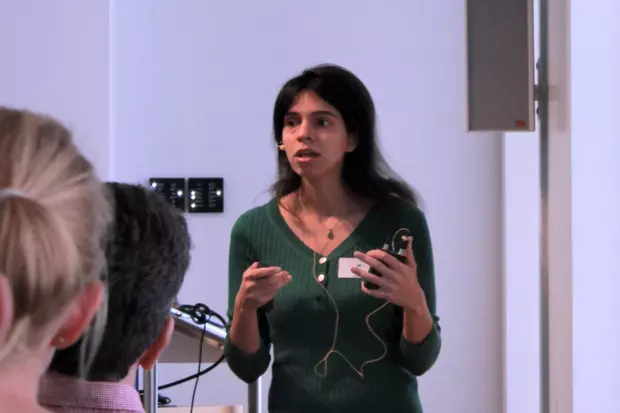Heterostructure Semiconductor Physics

The Heterostructure Semiconductor Physics group is led by Professor Dr. Safa Shoaee who holds a joint position at PDI and University of Potsdam. The group was established in mid-2023 as a collaboration between the two institutions and currently includes staff from both locations.
Research Summary
The group has a primary research interest in the understanding and development of low cost, large area photovoltaic technologies.
The group's research interest is multi-interdisciplinary with a particular focus on the scientific understanding of the charge and spin kinetics and photophysics of organic semiconductors and other carbon-based disordered semiconductors - the working principles and loss-mechanisms - for use in photonic device concepts; aiming to elucidate design principles that enable technological development.
Light driven electron and energy transfer reactions on relevant timescales, and electronic response of device, are studied by employing time resolved and steady state optical and optoelectrical spectroscopic techniques to explain the relationship between device property and molecular structure. These techniques offer a broad spectrum of analytical tools that have proved vital in analysing disordered solar cells.
We have many collaborations, including with experts on innovative material synthesis, modelling and morphological studies. Current collaborators are: University of Potsdam, University College London, Korea University, South China University of Technology.
Research Highlight
A new characterisation lab was built and established to set the base for reduced-Langevin recombination studies and related scientific work at University of Potsdam. The core expertise that was developed is the analysis, understanding and development of reduced-Langevin recombination motivated aspects towards higher FF, for upscaling and industrialisation of organic solar cells.
In view of the project targets, the group has published a number of papers with developed models on recombination.
One particular highlight is the study bridging charge generation and recombination by studying the field dependent charge generation efficiency and recombination kinetics for over 20 organic systems. A meta-analysis of the device performance for numerous bulk heterojunction organic solar cells was presented - for which field dependent photogeneration, charge carrier mobility and fill factor were determined. From this analysis a ‘spin-related factor’ which is dependent on the ratio of back electron transfer of the triplet CT states to the decay rate of the singlet CT states, was introduced. It was shown that this factor links the recombination reduction factor to the charge generation efficiency.
Staff
Safa Shoaee - Group leader
Nurlan Tokmoldin - Postdoc
Aren Yazmaciyan - Postdoc
Doyoung Sun - PhD Student
Faezeh Ashtari Mahini - PhD Student
Jonathan Langentepe-Kong - PhD Student
Elifnaz Saglamkaya - PhD Student
Bowen Sun - PhD Student
Manasi Pranav - PhD Student
Saeed Shadabroo - PhD Student
James Robert Benson - Student Assistance
Yonglin Cao - Master Student